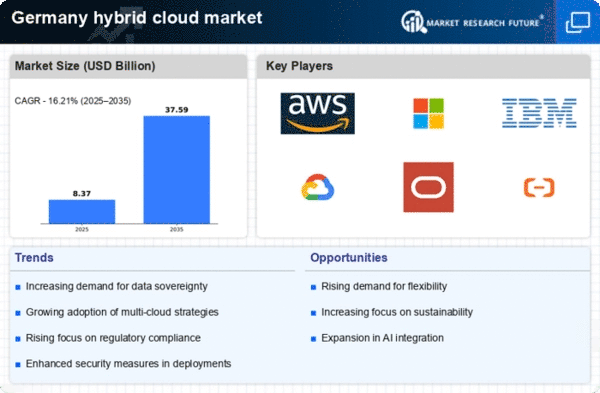Growing Demand for Scalability
The hybrid cloud market in Germany experiences a notable surge in demand for scalable solutions. Organizations are increasingly seeking flexibility to adjust their IT resources based on fluctuating workloads. This trend is particularly evident in sectors such as finance and healthcare, where the need for rapid scalability is paramount. According to recent data, approximately 60% of German enterprises indicate that scalability is a critical factor in their cloud strategy. The hybrid cloud model allows businesses to seamlessly integrate on-premises infrastructure with public cloud services, enabling them to scale operations efficiently. This growing demand for scalability is likely to drive investments in hybrid cloud solutions, as companies aim to enhance their operational agility and responsiveness to market changes.
Enhanced Focus on Cost Efficiency
Cost efficiency remains a pivotal driver in the hybrid cloud market in Germany. Organizations are increasingly recognizing the financial advantages of adopting hybrid cloud solutions, which allow them to optimize their IT expenditures. By leveraging a combination of on-premises and cloud resources, companies can reduce capital expenses while maintaining operational flexibility. Recent studies suggest that businesses utilizing hybrid cloud strategies can achieve cost savings of up to 30% compared to traditional IT models. This focus on cost efficiency is particularly relevant in the current economic climate, where organizations are under pressure to maximize their return on investment. As a result, the hybrid cloud market is likely to witness continued growth as companies seek to balance performance with budgetary constraints.
Regulatory Compliance and Data Sovereignty
In Germany, regulatory compliance and data sovereignty are critical considerations influencing the hybrid cloud market. With stringent data protection laws, such as the General Data Protection Regulation (GDPR), organizations must ensure that their cloud solutions adhere to local regulations. The hybrid cloud model offers a viable solution, allowing businesses to store sensitive data on-premises while utilizing public cloud resources for less critical applications. This approach not only enhances compliance but also addresses concerns regarding data sovereignty. Approximately 70% of German companies express a preference for hybrid solutions to meet their compliance needs. As regulatory frameworks continue to evolve, the hybrid cloud market is expected to expand, driven by the necessity for secure and compliant data management.
Rising Need for Disaster Recovery Solutions
The rising need for robust disaster recovery solutions is a key driver in the hybrid cloud market in Germany. Organizations are increasingly aware of the potential risks associated with data loss and system failures. Hybrid cloud solutions provide a comprehensive approach to disaster recovery, allowing businesses to back up critical data across multiple environments. This capability is particularly vital for industries such as finance and manufacturing, where downtime can result in substantial financial losses. Recent surveys indicate that nearly 65% of German enterprises prioritize disaster recovery in their cloud strategy. As the demand for reliable disaster recovery solutions continues to grow, the hybrid cloud market is expected to expand, offering organizations the resilience needed to navigate unforeseen challenges.
Technological Advancements in Cloud Services
Technological advancements play a significant role in shaping the hybrid cloud market in Germany. Innovations in cloud computing, such as artificial intelligence (AI) and machine learning (ML), are enhancing the capabilities of hybrid cloud solutions. These technologies enable organizations to analyze vast amounts of data in real-time, improving decision-making processes and operational efficiency. Furthermore, advancements in containerization and orchestration technologies facilitate seamless integration between on-premises and cloud environments. As a result, businesses are increasingly adopting hybrid cloud strategies to leverage these technological benefits. The hybrid cloud market is likely to grow as organizations seek to harness the power of emerging technologies to drive innovation and competitive advantage.
















